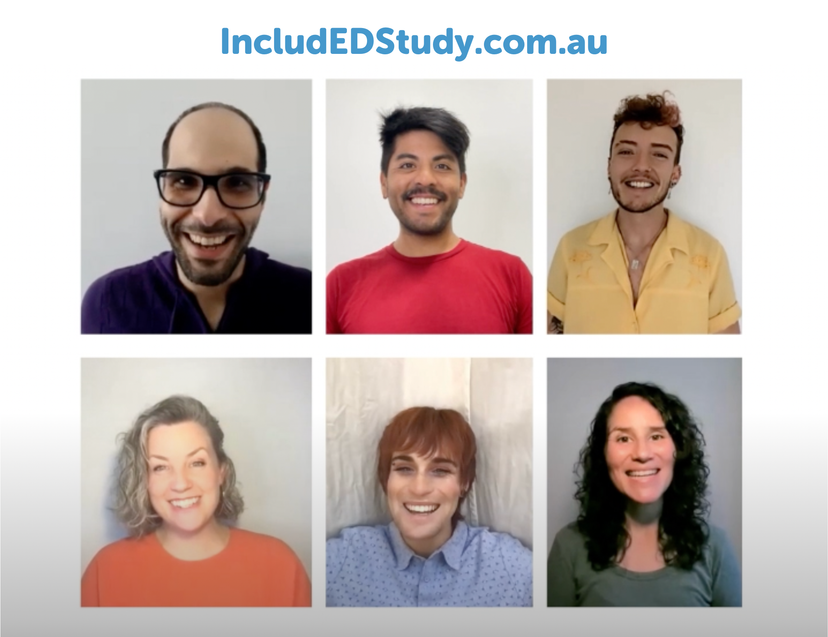© 2026 InsideOut
InsideOut acknowledges the tradition of custodianship and law of the Country on which the University of Sydney and Charles Perkins Centre campus stands. We pay our respects to those who have cared and continue to care for Country. We are committed to diversifying research and eliminating inequities and discrimination in healthcare. We welcome all people regardless of age, gender, race, size, sexuality, language, socioeconomic status, location or ability.

InsideOut Institute for Eating Disorders has launched a new study to better understand the mental health, body image, eating and exercise concerns of people within the LGBTQIA+ community.
The IncludED Study is the first Australian survey to consider disordered eating and eating disorder diagnoses in LGBTQIA+ adults collectively.
Eating disorders are serious mental illnesses associated with high rates of mortality and low rates of detection and intervention. Previous research has indicated that people within the LGBTQIA+ community may be at an increased risk of body image and eating concerns. Community members tends to use health services less and delay seeking treatment and support due to anticipated or actual experiences of stigma by the service providers.2
Lead researcher and Clinical Psychologist Dr Jane Miskovic-Wheatley (she/her) explains, “Homophobia, transphobia, discrimination, bullying, trauma, abuse and alienation from family and certain parts of society can all result in high levels of emotional stress. Sometimes these issues, in addition to other risk factors, can lead to body image issues or an eating disorder.”
“More than one million Australians are living with an eating disorder at any given time. There is evidence to suggest those who identify as sexually or gender diverse have an increased risk. But we need a more reliable, sensitive and broad-minded understanding so we can work towards better advocacy and healthcare,” said Dr Miskovic-Wheatley.
Australian research indicates two thirds of trans young people have limited their eating because of their gender.3 US research indicates that 54 percent of LGBTQ adolescents have been diagnosed with an eating disorder during their lifetime, with an additional 21 percent suspecting that they had an eating disorder at some point during their life. 4
Co-researcher Dr Phillip Aouad (he/him) explains, “We suspect the prevalence could be similar in Australia, but we also need to understand the predictors of body shape and weight concerns, eating disorders and excessive exercise so understanding and support can be offered much earlier.”
The IncludED study has been designed by members of the LGBTQIA+ community, for the community.
[[pdfAttachment]] |<div class="list"><div class="element"><a href="https://www.includedstudy.com.au/" target="_blank" rel="noopener noreferrer"><span class="icon"></span><span class="title">Head to IncludedStudy.com.au to find out more</span><span class="text"></span><span class="date"></span></a></div></div>
Co-researcher Kai Schweizer (they/he), a sexologist, youth worker, and LGBTIQA+ research specialist explains that: “Eating disorders don’t discriminate and can affect any person at any stage in their lives, regardless of age, sexual or gender identity, or cultural background.”
“We need research to be directed towards the diversity of people who develop eating disorders and for that diversity to be reflected in the research teams themselves.”
Kai is interested in understanding exercise and eating behaviours in trans and gender diverse people and helping to develop recommendations for screening and supporting healthy behaviours.
“An Australian study found that almost a quarter (23 percent) of trans young people have a current or previous diagnosis of an eating disorder.3 These numbers are too high,” said Kai.
Co-researcher Marcellinus Kim (he/him) is the Eating Disorder Coordinator for Sydney Local Health District and says the IncludED study will also investigate people’s connections to health services and treatments.
“Traditionally, the LGBTQIA+ community has faced unique barriers to seeking understanding, support and treatment, including stigma, discrimination and a lack of gender-affirming care. We need to do better. By understanding more about the LGBTQIA+ community’s interactions with the health system, successes and challenges, we can start to break down some of these barriers.”
The IncludED study is anonymous and takes 15 minutes to complete online, says co-researcher Dr Sabina Vatter.
“Whether you have had a lived experience of body image or eating concerns, or not, everybody aged 16+ in the LGBTQIA+ community is invited to take part,” said Dr Vatter.
Head to IncludedStudy.com.au to find out more.
This study has been approved by the Ethics Review Committee (RPAH Zone) of the Sydney Local Health District. Any person with concerns or complaints about the conduct of this study should contact the Executive Officer on 02 9515 6766 and quote protocol number X22-0419.
References: